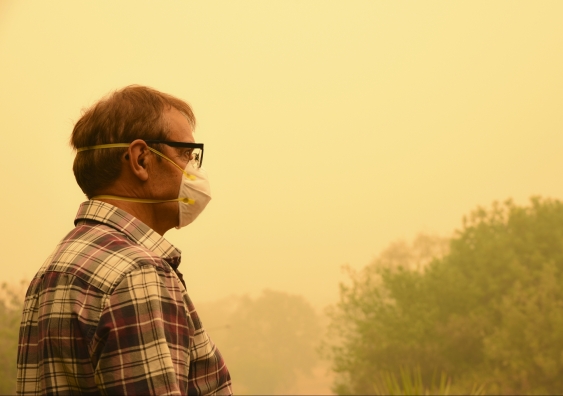UNSW has academic experts available to comment on May's federal government budget announcements.
On 14 May, the Australian government will deliver the 2024-25 federal budget.
The following UNSW experts are available for comment on relevant themes.
Experts who are available for comment on various federal budget topics
Gigi Foster, Professor of Economics, School of Economics, UNSW Business, is available to comment on any aspect of the budget. She can be reached at gigi.foster@unsw.edu.au. Prof. Foster says, “Will we see mainly more ideological posturing and handouts, or serious efforts towards economically sensible structural reform to address Australia’s many problems in housing, cost of living, energy policy, immigration, competition, and other areas.”
Richard Holden, Professor of Economics, School of Economics, UNSW Business, is available to comment on any aspect of the budget including its economic impact. He can be reached at richard.holden@unsw.edu.au. (Please note: Prof.Holden will be in the budget lockup).
Verity Firth AM, UNSW Vice-President Societal Impact, Equity and Engagement and Professor of Practice, School of Education, UNSW Arts, Design and Architecture, is available for comment. She can be reached at v.firth@unsw.edu.au. Prof. Firth can discuss the federal budget from an educational angle, particularly, the Australian Universities Accord, Student Equity, and Higher Education Harmonisation. Prof. Firth has extensive experience across equity in education and addressing educational disadvantage, having served as Minister for Education and Training in New South Wales (2008-2011) and then as the Chief Executive of the Public Education Foundation before joining the higher education sector. (Please note: Professor Firth will be in the budget lockup).
Peter Swan, Professor of Finance, School of Banking and Finance, UNSW Business, is available for comment. He can be reached at peter.swan@unsw.edu.au. Prof. Swan is available to speak about housing, stage-3 tax cuts, energy and environment.
Mark Humphery-Jenner, Associate Professor of Finance, School of Banking and Finance, UNSW Business, is available to comment on any aspect of the budget. He can be reached at m.humpheryjenner@unsw.edu.au.
Cost of living
Dr Nalini Prasad, Senior Lecturer at the School of Economics, UNSW Business, is available for comment. She can be reached at nalini.prasad@unsw.edu.au. Dr Nalini says, “The government wants to reduce the cost-of-living pressures. But putting more money in the hands of households risks driving up demand and increasing prices. This measure could be self-defeating.”
Housing
Dr Chris Martin, Senior Lecturer at the City Futures Research Centre, UNSW Arts, Design & Architecture, is available for comment. He can be reached at c.martin@unsw.edu.au. His research interests are in rental housing and housing affordability. Dr Martin says, “Australia urgently needs a major investment in social housing to address the chronic lack of affordable options for low-income renters and homeless persons.”
Hal Pawson, Professor and Associate Director at the City Futures Research Centre UNSW Arts, Design & Architecture, is available for comment. He can be reached at h.pawson@unsw.edu.au. His main area of research is housing policy governance and strategy. Prof. Pawson says, “To ease immediate pressure, The Federal Budget 2024 could significantly increase Rent Assistance and, for longer-term relief, double the investment in social housing construction.”
Stage 3 Tax Cuts
Ann Kayis-Kumar, Associate Professor of Tax at the School of Accounting, Auditing & Taxation, UNSW Business, is available for comment. She can be reached at a.kayis@unsw.edu.au. A/Prof Kayis-Kumar says, “The amendments to the Stage 3 tax cuts were a politically sensible and economically sound course correction, grounded in the good tax design principle of vertical equity. In other words, these amendments prevented the system from becoming less fair in a time of increasing financial stress for most Australians.”
Dale Boccabella, Associate Professor of Tax at the School of Accounting, Auditing & Taxation, UNSW Business, is available for comment. He can be reached at d.boccabella@unsw.edu.au. A/Prof. Boccabella’s expertise lies in most areas of the income tax system including, taxation of partnerships, trusts and companies, capital gains tax, fringe benefits tax and fundamental structural aspects of the income tax system.
Dr Rodney Brown, Senior Lecturer at the School of Accounting, Auditing & Taxation, UNSW Business, is available for comment. He can be reached at rodney.brown@unsw.edu.au. Dr Brown can comment on the impact of the Stage 3 tax cuts and whether the Government could have gone further with them.
Environment and climate change
Dr Tim Neal, Senior Research Fellow at the School of Economics, UNSW Business, is available for comment. He can be reached at timothy.neal@unsw.edu.au. He can comment on climate change and its role in the budget. Dr Neal says, “I am an economist who researches the economic impacts of future climate change. I will be able to speak to the initiatives in the budget that relate to climate change and how they may interact with the economy.”
Veena Sahajwalla, Scientia Professor at the School of Materials Science and Director of the UNSW Sustainable Materials Research and Technology (SMaRT) Centre, UNSW Science, is available for comment. She can be reached at s.snell@unsw.edu.au. Prof Sahajwalla, who is a leading expert in recycling science, is available to discuss recycling science, industry collaboration and sustainability for materials. Prof. Sahajwalla says, “Manufacturing is coming under much greater focus here in Australia, and for good reason: to help ensure we have the capability to produce the things we need. But this renewed focus now gives us the opportunity to ensure we can do this more sustainability, to use waste as a resource and create new supply chains.”
Energy
Katja Ignatieva, Associate Professor, School of Risk & Actuarial Studies, UNSW Business, is available for comment. She can be reached at k.ignatieva@unsw.edu.au. A/Prof. Ignatieva can comment on factors impacting prices and volatilities in energy markets; supply and demand imbalances, geopolitical events impacting prices; forecasting market trends and integration of renewable energy sources.
Dr Edward Obbard, Associate Professor at the school of Mechanical and Manufacturing Engineering, UNSW Engineering, is available for comment. He can be reached at e.obbard@unsw.edu.au. A/Prof. Obbard can comment on researching nuclear materials, nuclear engineering education, nuclear safety, and nuclear power/propulsion technology.
Dr Mike Roberts, Senior Lecturer at the School of Photovoltaic and Renewable Energy Engineering, UNSW Engineering, is available for comment. He can be reached at m.roberts@unsw.edu.au. Dr Roberts can comment on how the budget affects household energy issues (rooftop solar, home batteries, EVs, etc.)
Domestic violence
Dr Patricia Cullen, Senior Lecturer at the School of Population Health, UNSW Medicine & Health, is available for comment. She can be reached at patricia.cullen@unsw.edu.au. Dr Cullen says, “We need real investment into supporting women and children’s recovery from the traumatic impacts of domestic, family and sexual violence through healing informed practice and therapeutic supports.”
Dr Emma Buxton-Namisnyk, Senior Researcher at the School of Law, Society & Criminology, UNSW Law & Justice, is available for comment. She can be reached at e.buxton-namisnyk@unsw.edu.au. Dr Buxton-Namisnyk has analysed more than 3000 domestic violence homicide cases in Australia. The NSW Government has enlisted Dr Buxton-Namisnyk to build a comprehensive risk-assessment framework to help ensure all domestic violence victim-survivors receive a consistent, appropriate, and safe response wherever they present. She recently co-published a series of legal and cultural change recommendations to address violence against women.
Rosalind Dixon, Professor of Law at the School of Global & Public Law, UNSW Law & Justice, is available to comment. She can be reached at rosalind.dixon@unsw.edu.au. She recently spoke to ABC Radio regarding legal, institutional and cultural changes to address violence against women – including bail law reform, increased ADVO breach penalties and specialist DV magistrates. Prof. Dixon also recognised emergency financial assistance as a critical intervention that requires broader housing, psychological and legal support.
Dr Michael Salter, Professor of Criminology at the School of Social Sciences, UNSW Arts, Design & Architecture, is available for comment. He can be reached at michael.salter@unsw.edu.au. Prof. Salter is an expert in child sexual exploitation and gendered violence. His research team reported last year that almost 1 in 10 Australian men have committed a sexual offence against children. The report called for investment in initiatives that address concerning behaviour before it starts. He has recently spoken to the media regarding the influence of alcohol, pornography and gambling on domestic violence and called for a non-ideological look at the evidence of what keeps women safe.
Media enquiries
For any related media enquiries, please contact Katie Miller:
Tel: 0408 033 715
Email: katie.miller1@unsw.edu.au








